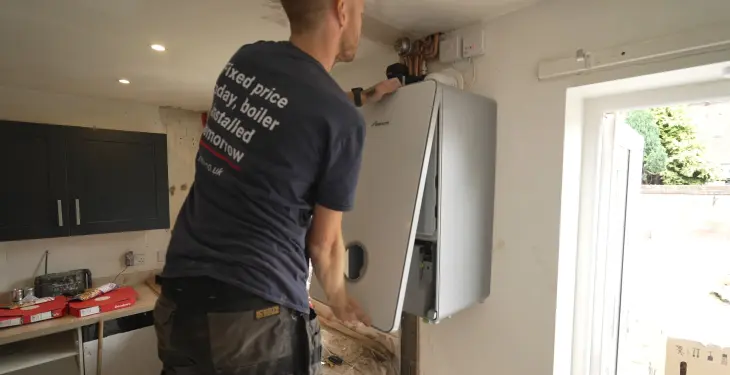

Written by Stephen Day
Gas Safe Engineer
Updated: 5th January, 2026
Based on data from over 7000 boiler installations completed by iHeat in the past 12 months, we’ve analysed the true cost of new boilers across the UK.
Get a new boiler quote, save up to £550 per year (0% APR available).
At iHeat, we’ve installed thousands of boilers nationwide, giving us firsthand insight into the real prices UK homeowners pay, not just the figures often quoted online.
The guide below combines recent iHeat installation data, engineer insight and common UK install requirements, so you can budget realistically for 2026.
New boiler cost examples (2026)* | |
|---|---|
Type of boiler | Total cost (inc. installation) |
Combi Boiler | £1,800 - £4,500 |
System Boiler | £1,800 - £5,000 |
Conventional Boiler | £1,800 - £5,000 |
Electric Boiler | £1,800 - £5,500 |
Oil Boiler | £2,200 - £5,000 |
The cost of a new boiler in the UK typically starts from around £1,800 and can reach £4,500 or more depending on your property, installation complexity, and chosen brand.
For context, Energy Saving Trust currently quotes typical replacement costs of around £3,700 for a gas boiler in Great Britain and £3,200 for an oil boiler in Northern Ireland, depending on the setup.
From our iHeat installations, the average real-world cost for a combi boiler replacement was £2,242. Most homeowners choose mid-range models like the Worcester Bosch 4000 balancing price, performance, and warranty length.
There are a lot of varying factors such as your location, boiler size, system type, property size and much more,
New boiler type | Average cost (excl. installation) | Average cost (incl. installation) |
|---|---|---|
Combi boiler | £600 - £2,500 | £1,800 - £4,500 |
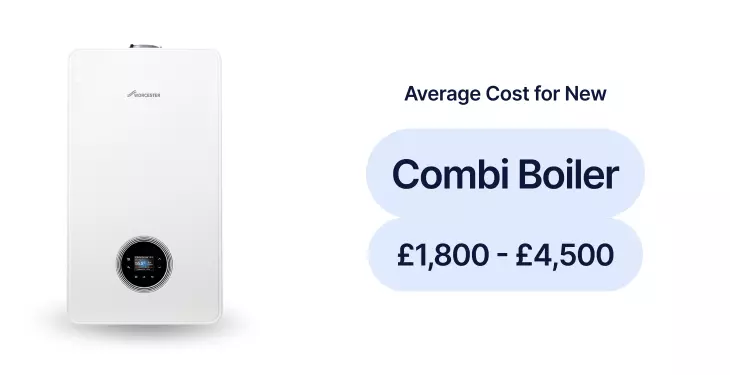
New Combi Boiler Average Cost (Installed): £1,800 - £4,500
Advantages: Space-saving, energy efficient, on-demand hot water.
Combi boilers have long since been the most popular type of boiler in the UK (around 80%) due to the fact they conveniently ‘combine’ both a home’s central heating duties and hot water production into one compact, powerful unit.
The price for a new combi installed can range due to many varying factors such as size, complexity and labour, however the average cost sits around £1,800 - £4,500 for a boiler suitable for a 3-4 bedroom home.
Best property match: smaller homes to medium homes, flats, properties with only one shower or bath.
Example: A recent installation in Manchester for a 2 bedroom terraced house with 1 bathroom cost £1,995, including full installation, removal of the old boiler and new pipework where needed.
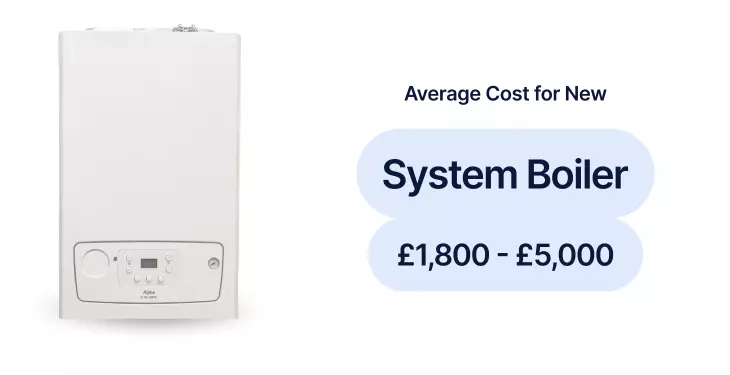
New System Boiler Average Cost (Installed): £1,800 - £5,000
Advantages: Powerful, stores hot water, great for larger spaces.
System boilers are perfect for homes with higher hot water demands, such as those with two or more bathrooms. System boilers work with a water cylinder which stores hot water to allow for high pressure service to multiple outlets at the same time.
Converting a system boiler to a combi often adds £300-£600 due to rerouting and removal of hot water cylinders.
Best property match: Larger properties or properties with more than one bathroom.
Example: Another recent installation by iHeat in September in the London area for a 4 bedroom, detached house with 1 bathroom and an en-suite cost the customer £2,695, this included full installation again.
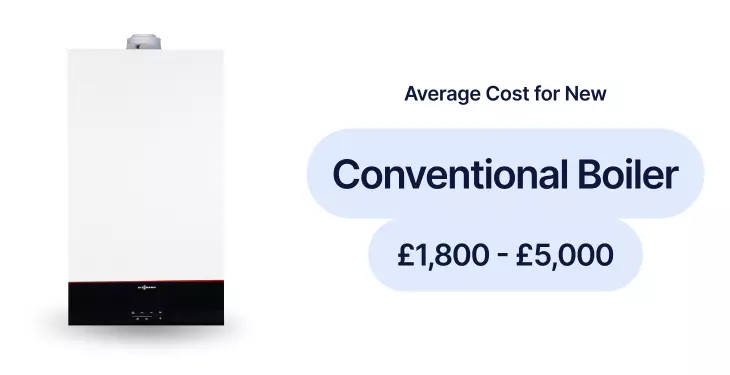
New Conventional Average Boiler Cost (Installed): £1,800 - £5,000
Advantages: Suited to large properties, reliable and consistent.
Conventional (heat-only or regular) boilers are very hardworking and a tad more long standing in terms of their design and function. They do however require an external hot water cylinder and cold water storage tank.
Converting a regular boiler to a combi often adds £300-£600 due to rerouting and removal of hot water cylinders.
Best property match: Big homes with more than one bathroom or lower water pressure.
Example: iHeat completed a regular boiler conversion to a combi-boiler recently for a 3 bedroom semi-detached house, this cost the customer £3,200 for the full conversion, this included everything to be back up and running again within 2 days.
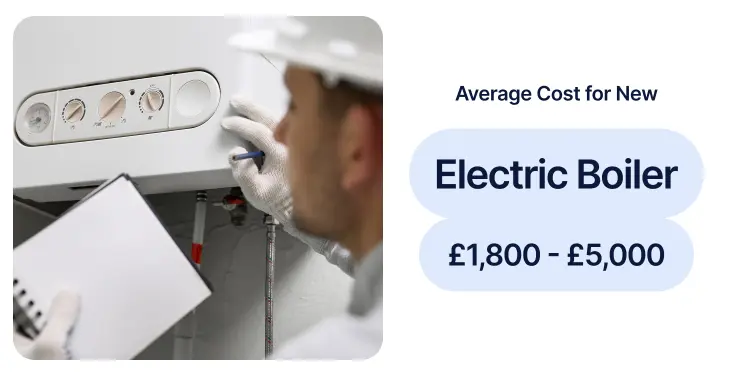
New Electric Boiler Average Cost (Installed): £1,800 - £5,000
Advantages: Very high-efficiency, more environmentally friendly
Electric boilers are a fantastic option for larger homes, especially those without a connection to gas. New electric boilers are not only highly efficient but also considered ‘green’ due to their lack of reliance upon fossil fuels.
Often the cost of an electric boiler may be cheaper than gas due to the fact they do not require a flue or specific pipework. However, it should be noted that electricity is actually more expensive in terms of running costs compared to gas.
Best property match: Properties with no established gas connection, ‘green’ homes.
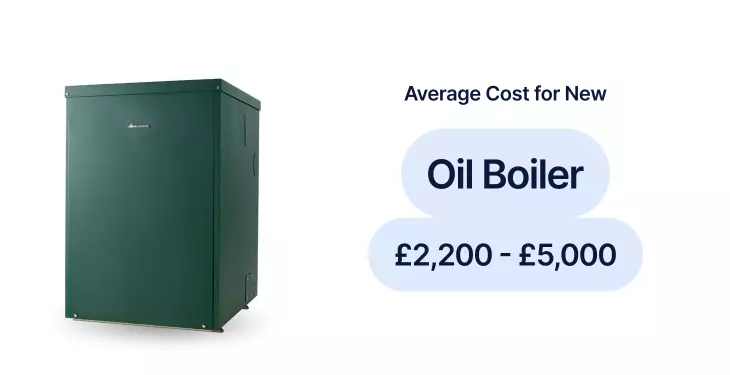
New Oil Boiler Average Cost (Installed): £2,200 - £5,000
Advantages: Great for homes that are rural or off-grid
Oil Boilers are an older type of system, strong but most commonly found in rural properties or homes that do not have an established gas connection.
Best property match: Rural or countryside homes within no gas connection.
It can be important to remember that the cost of a new boiler replacement isn’t only the cost of the appliance itself, but also everything that goes into the process to ensure safety and efficient performance.
From our experience installing thousands of boilers, most UK homes fall between £1,900 and £2,800 once flue upgrades and filters are included.
The cost of a boiler can vary depending on the brand of the boiler. Some manufactures have outstanding quality of build and remembering the old saying "you get what you pay for".
Based on iHeat installations over the last 12 months, the average real-world cost for a combi boiler replacement was £2,242.
Boiler brand | Combi boiler | System boiler | Conventional boiler |
Worcester Bosch | £700 - £2,600 | £800 - £2,800 | £800 - £2,800 |
Vaillant | £900 - £3,000 | £1,000 - £3,400 | £1,000 - £3,400 |
Viessmann | £600 - £3,600 | £800 - £4,000 | £800 - £4,000 |
Ideal | £700 - £2,600 | £900 - £3,000 | £900 - £3,000 |
Alpha | £650 - £2,300 | £700 - £2,600 | £700 - £2,600 |
Baxi | £600 - £1,800 | £650 - £1,900 | £650 - £1,900 |
A quick guide on what common additional costs you may need to account for when it comes to getting a brand new shiny boiler. This includes a typical breakdown in costs of everything needed for a new boiler installation/replacement.
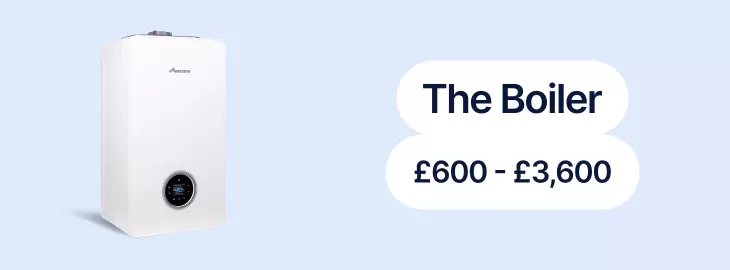
Of course the main fee for boiler installation is that of the actual new boiler unit itself, without labour. New boilers (just for the boiler unit) can often cost into the early thousands, especially for trusted and award-winning models.
Average boiler unit cost: £600 - £3,600
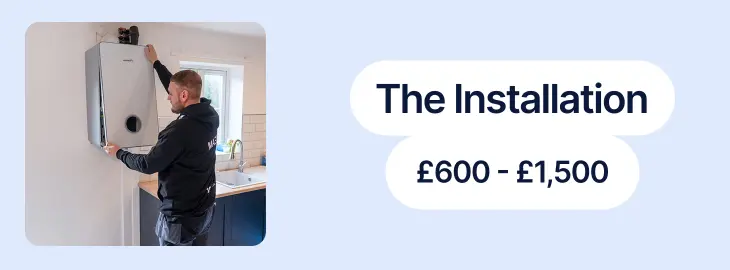
The next most vital fee to consider is the cost of the boiler being installed by a Gas Safe heating engineer.
This exact amount of this fee is usually dependent on several factors unique to each boiler installation, such as:
Region of the property
Complexity of the install
Boiler type and model
Number of engineers required
Added work (system or piping replacements)
Some more straightforward installations such as direct like for like swaps are far quicker and less expensive than old system conversions, for example.
Installation costs are always included in any fixed price iHeat new boiler quote, so you don't have to worry.
Average installation costs: £600 - £1,500

The flue is the pipe that transports exhaust gases to outside the home, an essential safety feature. Flues can either be vertical (straight up through the roof) or horizontal (sideways through a wall).
Vertical flues often require more intensive labour to fit correctly, and can therefore provide a higher cost.
Average vertical flue cost: £350 - £550
A plume kit is a component which extends the flue in order to divert the exit fumes in a safe manner, should the flue be deemed too close to features such as windows or gardens. A tad annoying as an additional cost perhaps, but an essential piece of safety equipment.
Average plume kit cost: £80 - £150

If your home has 15mm pipes they’ll need to be upgraded to roomier, and more efficient 22mm ones.
Here at iHeat, we safely swap out all old 15mm piping to new robust 22mm completely FREE, at no extra cost where applicable.
Average cost: £200 - 800
iHeat gas pipe upgrade cost: FREE

Moving your boiler to a new spot in your home can increase the overall cost, as it’s a more complex job.
The engineer needs to safely relocate the boiler and pipework, making sure everything is reconnected properly so your heating runs just as smoothly as before.
The price very much depends on where your boiler is currently located and where its moving location to, the average cost can range from £400 to £1200+.
New location | Cost (labour and materials) |
|---|---|
Same room | £400 - £800 |
Another room | £700 - £1,000 |
Another floor | £800 - £1,200 |
Loft/attic | £800 - £1,200 |

CO (carbon monoxide) alarms are a specialist bit of kit that alerts a homeowner to potentially life threatening hazardous gas leaks.
With every new boiler installation iHeat offers a FREE CO alarm.
Average cost: £10 - £20
iHeat CO alarm cost: FREE

Helpful technology such as wireless thermostats allow a homeowner to easily control or adjust their property’s central heating or hot water production, all at the click of a button.
with every new boiler installation, iHeat offer a FREE wireless thermostat.
Average cost: £40 - £80
iHeat wireless thermostat cost: FREE

A boiler warranty is a little extra peace of mind for a homeowner that should a boiler begin to have issues at no fault of their own, within an appropriate time period, the manufacturer agrees to either fix or replace the unit.
Boiler manufacturers often offer extended warranties highlighting their confidence in their boilers performance and longevity.
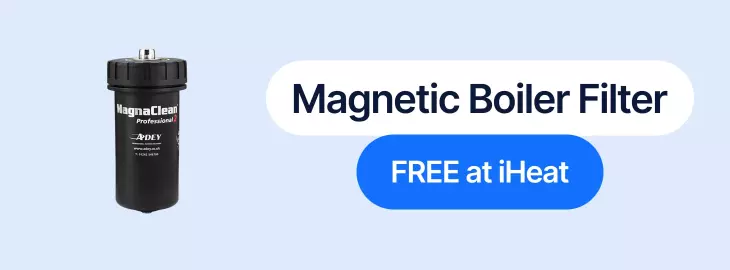
Magnetic boiler filters trap pesky debris within the system to keep your boiler in the best possible working condition for the longest amount of time possible.
With every iHeat installation you get a FREE magnetic filter to protect your boiler from sludge and debris.
Average cost: £80 - £120
iHeat magnetic boiler filter cost: FREE

Chemical flushes are a system cleaning procedure that will remove any unwanted bits and bobs to allow your new boiler to run as best it can.
Chemical flushes are offered as part of every new boiler installation for FREE with iHeat.
Average cost: £20 - £60
iHeat chemical flush cost: FREE
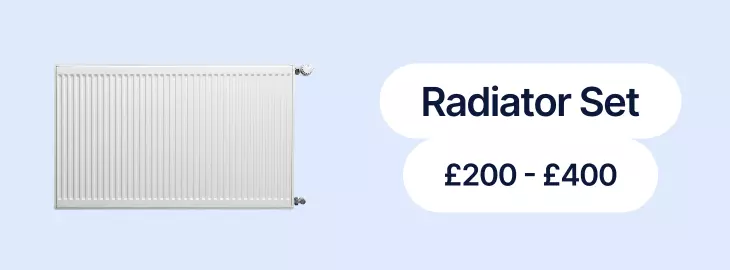
Even after installing a brand new boiler, if your property's radiators are useless, your home still won’t be as toasty as you desire. If this is the case it’s worth replacing the older radiators with new and heat efficient ones.
Average radiator cost (per radiator): £200 - £400
The total cost of a new boiler installation also depends on the size and layout of your home.
Larger homes or more complex properties tend to incur higher labour and material costs.
The table below gives indicative ranges for common UK property types based on typical installations and our experience.
Property type | Typical bedrooms | Cost range | Notes |
|---|---|---|---|
Flat / apartment | 1-2 bedrooms | £1,600 - £3,000 | Often simpler setup; less flue/piping work |
Mid-terraced house | 2-3 bedrooms | £2,000 - £3,500 | Standard installation, minimal re-pipe |
Semi-detached house | 3-4 bedrooms | £2,500 - £4,000 | More radiators, possibly two bathrooms |
Detached house | 4+ bedrooms | £3,000 - £5,500+ | Larger system, more complex layout |
Ranges are based on typical installations. Final cost will depend on boiler type, fuel type, system condition, pipe-work, location, and any required upgrades.
The UK government supports eligible households with heating upgrades under the ECO4 Scheme (Energy Company Obligation). While it is not a general boiler replacement grant, it can cover part or all of a new boiler installation if you meet the criteria.
Homes with an EPC rating of D, E, F or G.
Households classed as fuel-poor or receiving certain qualifying benefits (eg Universal Credit, Pension Credit, Housing Benefit) and with an inefficient heating system.
Measures can include boiler replacement/upgrades, heating controls, insulation or first-time central heating.
The scheme is available until 31 March 2026 for installations from 1 April 2022 onwards.
You cannot simply apply yourself: an approved installer carries out the assessment and submits the application.
The amount of support varies and you may still have to cover part of the cost, a full free replacement is not guaranteed.
If your property qualifies, you could reduce the upfront cost of a new boiler by a significant margin. But if you do not meet the criteria (good EPC rating, no qualifying benefit, etc), you will need to budget the full cost yourself, so factoring in this possibility is wise.
Please note: eligibility depends on your personal and property circumstances. Always check your property’s EPC rating and speak with a Gas Safe installer to confirm whether you qualify for ECO4 funding.
Over the years, we’ve noticed that customers who book during spring or summer often save up to 10% compared with peak winter installs. Installers have more availability, and prices tend to be lower, a small but useful tip based on our own scheduling trends.
Modern gas boilers are far more energy efficient than older models, meaning by installing a new boiler, you would actually start to save money long term due to the reduced energy bill costs.
At iHeat, we encourage customers to weigh efficiency and warranty length over the lowest upfront quote. A boiler that’s 5% more efficient can save hundreds over its lifetime.
How much will you save with an A-rated boiler, you ask? Well, here’s a quick breakdown:
Property type | G (<70%) | F (70-74%) | E (74-78%) | D (78-82%) |
Bungalow | £320 | £230 | £180 | £140 |
Detached house | £550 | £410 | £330 | £260 |
Flat (mid-floor) | £140 | £95 | £75 | £55 |
Semi-detached | £350 | £240 | £190 | £150 |
Mid-terrace | £290 | £210 | £160 | £130 |
These figures are estimates based on replacing an older boiler with a new A-rated condensing model, including a programmer, room thermostat, and thermostatic radiator valves (TRVs), in a gas-heated home.
Data is based on Energy Saving Trust boiler guidance and their published savings estimates. https://energysavingtrust.org.uk/advice/boilers/
The average new boiler cost in the UK can vary depending on the type of new boiler and the complexity of the installation.
Combi Boilers - efficient and space-saving, combi boilers are the UK’s most popular boiler with an average cost of £1,800 - £3,500.
System Boilers - powerful and suited to large properties, new system boilers have an average cost of £1,800 - £5,000.
Conventional Boilers - reliable and straightforward, ‘heat-only’ boilers have an average cost of £1,800 - £5,000.
Electric Boilers - environmentally friendly and very efficient, these boilers have an average cost of £1,800 - £5,500.
Oil Boilers - traditional and robust, oil boilers have an average cost of £2,200 - £5,000.
Biomass Boilers - the greenest option for eco friendly homes, these boilers have an average cost of £9,000 - £15,000.
Many homeowners fixate on boiler price alone, but our data shows extras like moving the boiler location, TRV's and smart thermostats make up 10-15% of total cost. Ignoring them can lead to unrealistic budget expectations.
Average combi replacement: £2,242
52% of homeowners choose 0% APR finance
25% add smart thermostats at installation
Most popular model: Worcester Bosch 4000
At iHeat, we believe in transparency. Our prices are based on real installation costs from an iHeat qualified Gas Safe engineers, not estimates.

Here’s why thousands of UK homeowners choose iHeat:
Gas Safe engineers install every boiler safely and professionally.
Fixed prices online, no hidden extras, ever.
Which? Trusted Trader accredited for consistent high standards.
Flexible finance options including 0% APR.
Up to 12-year manufacturer warranties on selected boilers.
Thousands of 5 star verified reviews from happy customers.
Bolton News Customer Service company of the year 2024
Get your instant fixed-price quote today and see how much you could save.
References
Energy saving trust - https://energysavingtrust.org.uk/advice/boilers/
Boiler upgrade scheme - https://www.gov.uk/apply-boiler-upgrade-scheme
*Information based on 7000+ boiler installations completed by iHeat last year across the entire UK. Please note: all cost ranges are indicative and based on typical installations. Final cost will depend on your property, boiler type, fuel source, location, system condition and inclusion of any upgrades. An online quote is required for an accurate price.
Yes, if they are in good condition and properly sized. However, upgrading older or corroded radiators can improve efficiency and heat output.
In most cases, yes. Modern boilers use different flue systems for safety and efficiency, and your installer will fit a compatible one during installation.
A straightforward combi-to-combi swap usually takes 1 day. Conversions or relocations can take 2–3 days depending on system complexity.
It depends on property size, number of bathrooms, and heating demand. Most 3-bed homes need a 24–30 kW combi boiler. Always confirm with a Gas Safe engineer.
Yes. Annual servicing by a Gas Safe engineer keeps your warranty valid and ensures your boiler runs safely and efficiently.
Last updated: 5th January, 2026

Written by Stephen Day
Gas Safe Engineer at iHeat
Stephen Day is a Gas Safe registered and FGAS certified engineer with over 20 years of hands-on experience in the heating, cooling, and renewable energy industry, specialising in boiler installations, air conditioning, and heat pump systems.
LinkedInArticles by Stephen Day are reviewed by iHeat’s technical team to ensure accuracy and reliability.
Contributors

Managing Director

13th February, 2026
Boiler energy efficiency refers to how well a boiler uses its fuel to generate heat. This...
 Read Article
Read Article

12th February, 2026
This Valentine’s Day we want to let you in on a dirty little secret…
 Read Article
Read Article

12th February, 2026
In this guide, we’ll be answering some of the most frequently asked questions about what h...
 Read Article
Read Article
No obligation. Takes less than 60 seconds.